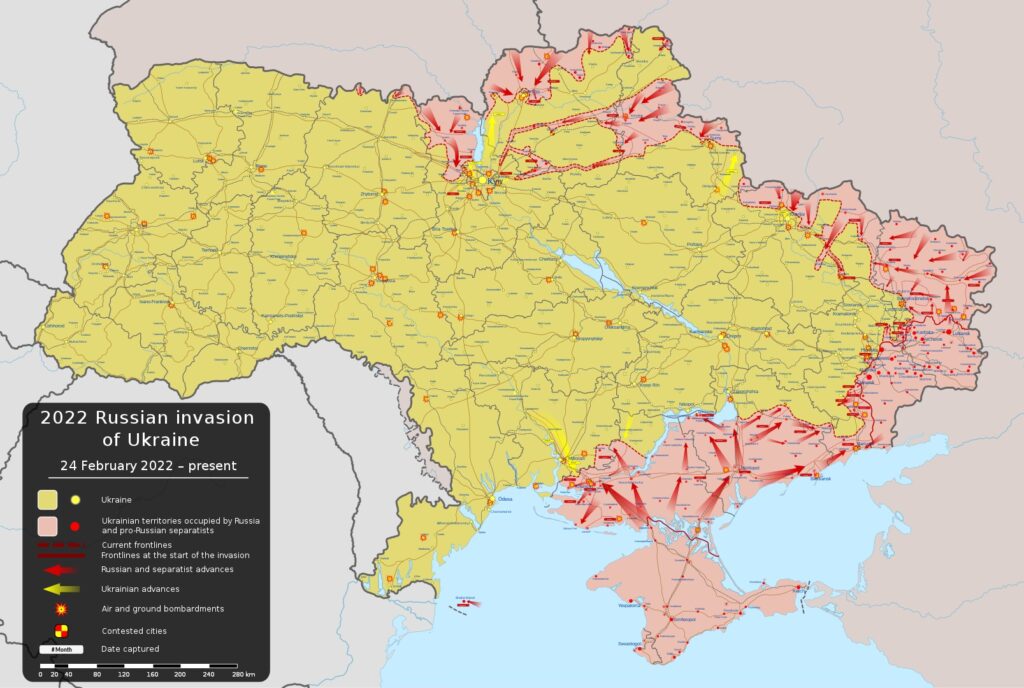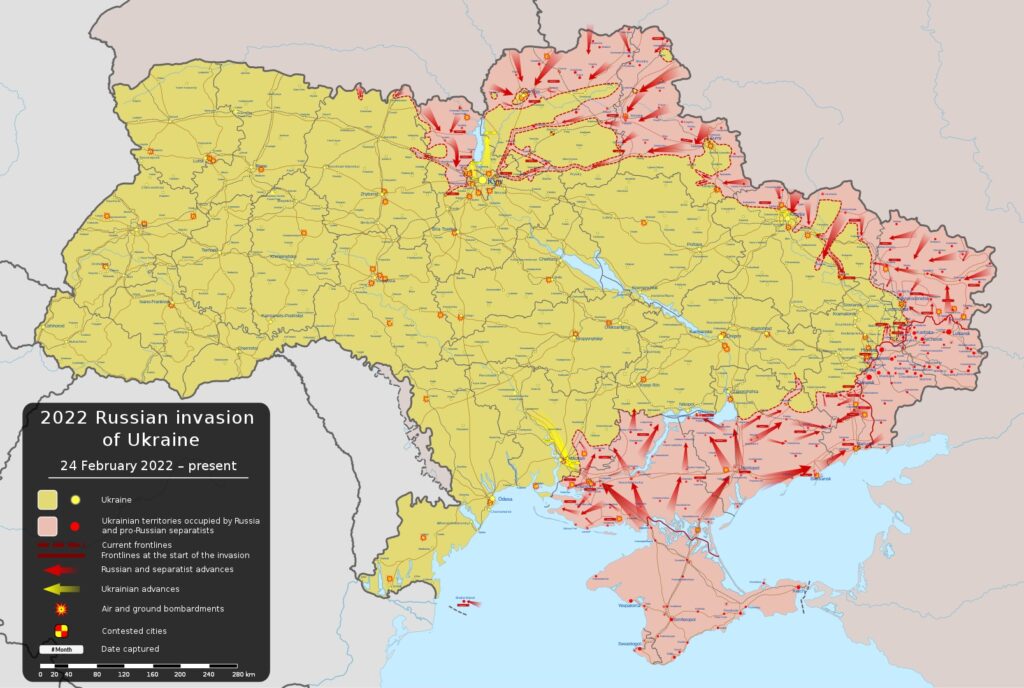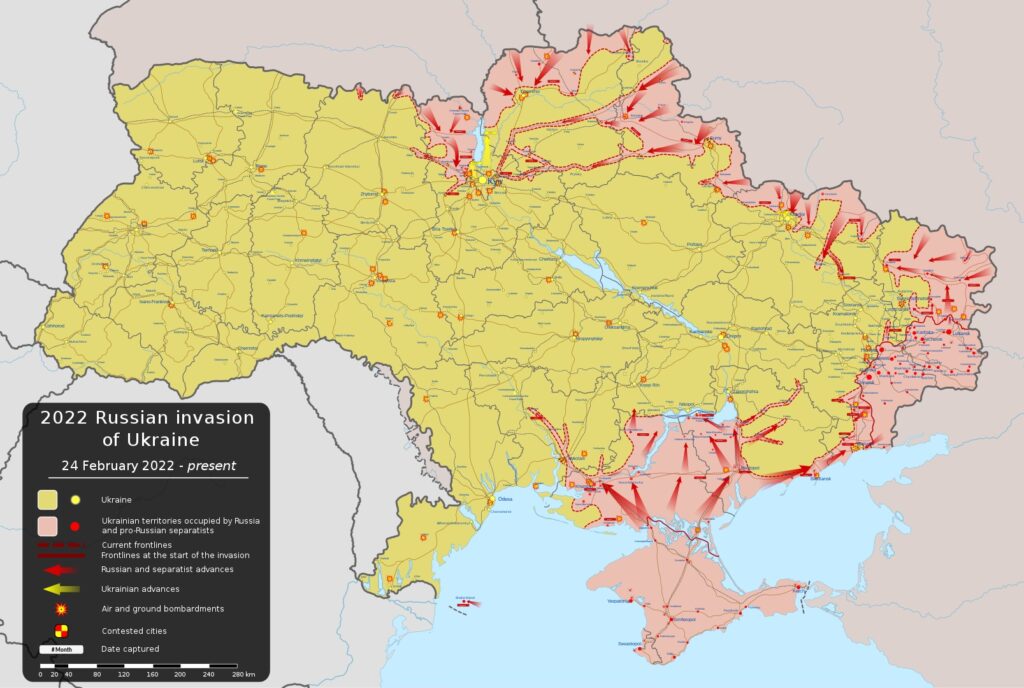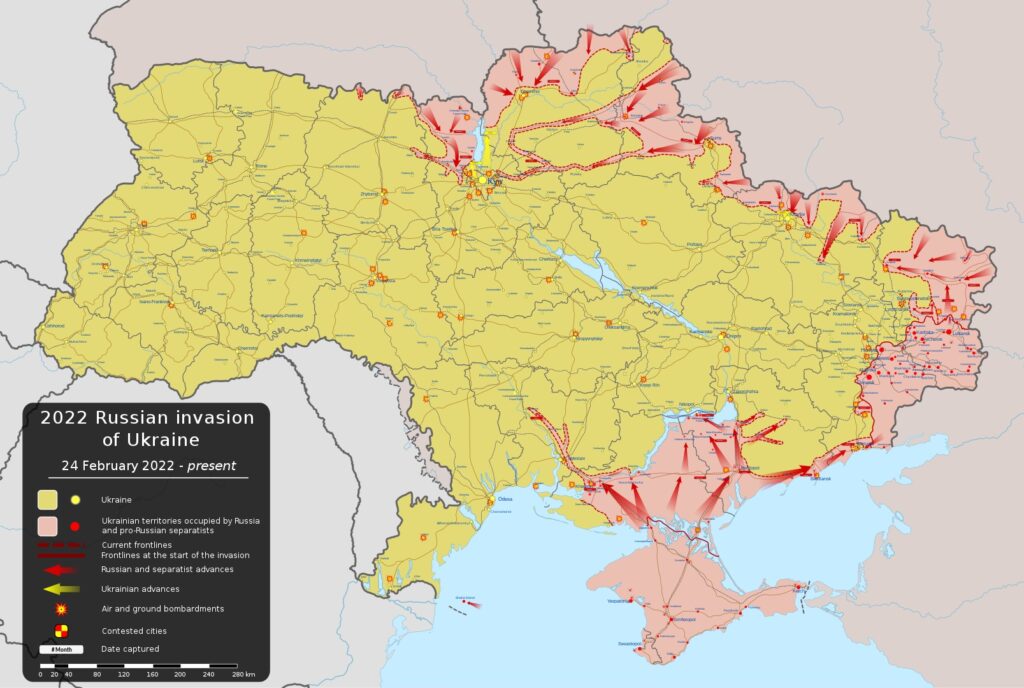
Peace talks between Russia and Ukraine in Istanbul drew headlines yesterday, but there was almost nothing to see. The war goes on in two main theatres: the fighting in Ukraine itself, and the economic assault on Russia conducted by the Western powers. Russia remains battered but unbeaten. Either something big breaks and one side is the clear victor, or the war will grind on to de-facto partition after both sides are exhausted. This is unlikely to be quick.
Russia drew headlines with the claim that it is scaling down its operations against Kyiv and Chernihiv as a gesture of goodwill. This is obvious nonsense. Intelligence suggests that Russia is withdrawing battered units from the area, but they seem to be replacing them with fresher units, albeit of doubtful quality. Heavy losses and logistical strains have forced them to dial back, but there is no sign that they are ceding territory. The aim of the announcement seems to be twofold: to make a virtue out of necessity for the sake of world propaganda, and to prepare the ground for any Ukrainian counterattacks, which they can label as escalation.
For their part, the Ukrainians aren’t offering much either. They are stepping back from their stated aim of joining NATO. But instead they want security guarantees that add up to much the same thing, except that they have renounced the idea of foreign troops on their soil. There is no sign of any flexibility on Russia’s territorial demands on Crimea and the Donbas. Russia does seem to have stepped back from their demand for regime change, and Ukraine’s exclusion from the European Union. That is progress of a sort, but not enough to get our hopes up.
The peace talks are missing elements that might point to success. They are not being convened by a power with the ability to knock heads together. Turkey is an improvement on the talks held in Belarus, but you need the heft of the USA or China, or preferably both, to force the sides into serious compromise. America is vital to Ukraine’s ongoing resistance, and central to the sanctions regime that is causing Russia such pain. China can put decisive pressure on Russia. But both China and America are posturing on the sidelines and show no interest in moving a peace process along. On the other hand neither of the combatants is yet close to breakdown – so neither will concede defeat in a costly war. Any serious compromise on territory will amount to a defeat of one side or the other.
On the ground we have something of a war of attrition. Russia is slowly strangling Mariupol to death. Ukraine is slowly pushing the Russians back in the north. Russia is clearly suffering from resource constraints. It is struggling to maintain its human resources – and the reinforcements that it is finding are generally of poor quality. Much the same can be said of replacement equipment. Less obvious are any constraints on ammunition supplies. Their method of war once serious resistance is encountered is very demanding of ammunition. Just how far consumption is outstripping production is unclear – the various reports I read on the situation don’t touch on this aspect, as presumably good intelligence is hard to get. However my feeling is that Russia’s scaling back in the north has as much to do with this factor as anything else. One key factor will be whether China can offer a supply of munitions to keep the Russian war machine going.
What could break in Russia’s military campaign? Exhausted units could collapse and retreat. This is more likely in the north, where Russian positions look stretched and vulnerable. It would make sense for them to conduct a physical withdrawal to consolidate – though this could free up Ukrainian troops too. In the south Russian positions look much less exposed, but if their commanders keep trying to push their troops forward, there could be trouble. If ammunition supplies do start to get stretched, some kind of disaster is more likely. If Ukraine is able to build up enough reserves to carry out more than limited counterattacks and insurgency operations, then this will make a big difference.
But Ukraine has its own weaknesses. Military experts suggest that their forces in Donbas could get cut off by advances especially from the south. I don’t have a feeling of the level of danger here – these military experts have often been proved wrong and have spouted their fair share of nonsense. I heard one on the radio saying that attackers usually need a 3:1 advantage in numbers. This number originates from General Bernard Montgomery trying to explain why he made such heavy weather of the battle of El Alamein with a mere 2.5:1 advantage. Numbers required depend completely on the context, and any rule of thumb is nonsense. Ukraine needs a continuing supply of munitions from the West, and could do with more weapons that would allow it to take the offensive – such as aircraft and tanks. Their morale is much higher than that of the Russians, though, and it does look as if they have saved Kyiv.
What of the economic war? This does not look as bad for Russia as it did at first. Loopholes have been found in the sanctions. There have been no bond defaults. They are being helped by Turkey, Israel and the Arab states, as well as China. The rouble is recovering. They are still exporting substantial quantities of gas. Still the civilian economy is taking a bad knock, and doubtless unemployment will rise. The state propaganda machine is all-out building a sense of Russian patriotism which allows its fantastical propaganda to be believed. Dissent is being stamped out. The Russian middle class is taking a big battering, though, and that is leading to a big brain drain. Russia’s s not a robust, self-sufficient economy, and corruption is endemic. Something could break. But there are plenty of examples of countries withstanding sanctions in the long term (Cuba, Iran, Venezuela). This is not what the Russian people signed up to when they voted for Vladimir Putin, but the narrative of victimisation is being developed. A palace coup is possible – as presumably not all of the Russian ruling elite is signed up to Mr Putin’s messianic vision of Russia’s destiny. But the first we would hear of that is the day after it happens.
How about the West’s resolve? The war is taking its toll, but public support is widespread. A life or death struggle of this nature is more engaging than our normal humdrum existence. The main problem is knowing how far the West can go in providing aid to Ukraine without provoking Russia into a military response. Russia’s ground forces are now overstretched, and cannot credibly threaten any NATO country. But they have a strong navy, long range bombers and missiles, and a formidable nuclear capability. Western leaders have managed this risk by defining clear limits to their interventions. This has been criticised by many of the more aggressive commentators, but it heads off the risk of a Russian first strike. Doubtless military options are being considered by Nato planners, and confidence in Western military doctrine and weapons have been given a huge boost by Russia’s struggles. But such options will only be considered if Ukraine is facing military collapse, and would aim to limit the damage.
Where is this war headed? The Ukrainian commentators who suggest the war might end in some form of de-facto partition and cease-fire, like Korea (still technically at war), are on to something. The Russian will eventually be driven out of or withdraw from the north. They will probably extend their territory in Donbas and secure a land bridge to Crimea. Unless something drastic breaks.
UPDATE: 31 March
It is confirmed that Russia has been withdrawing troops in north Ukraine, and not just rotating them. They are not abandoning territory, though, and continue with shelling. My suggestion that consumption of munitions is a limiting factor for Russia is not so far being borne out by the facts – not of low-tech artillery shells anyway. There are claims that Western sanctions applying to advanced electronics is preventing Russia from the production of advanced weapons and munitions, however. If so it is a critical strategic weakness for Russia with important implications.



